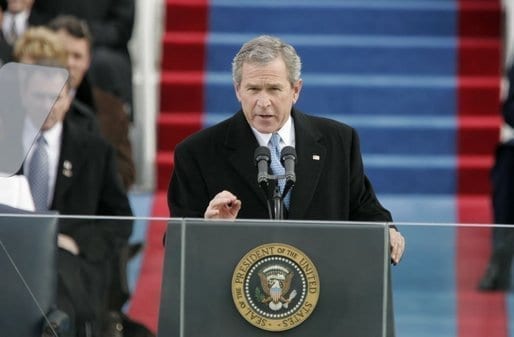

Conversation-based seminars for collegial PD, one-day and multi-day seminars, graduate credit seminars (MA degree), online and in-person.

No study questions
No related resources
The end of the Cold War (1947–1991) ushered in a new era in international relations and raised the question of how the United States should deal with the post-Cold War world. Like his immediate predecessors, President George W. Bush argued that the United States should promote democracy for America’s sake and for the benefit of the world. This included a global struggle against the people and ideas that sponsored the attacks on the United States on September 11, 2001. No less committed to protecting the United States and promoting democracy, President Barack Obama sought a different approach to Islam and less commitment overseas. Senator Rand Paul dissented from the consensus that he argued included both Bush and Obama. Denying he was an isolationist, Paul argued for greater restraint politically, militarily, and financially than he felt recent administrations of either party had shown.
. . . At this second gathering, our duties are defined not by the words I use but by the history we have seen together. For a half a century, America defended our own freedom by standing watch on distant borders. After the shipwreck of communism came years of relative quiet, years of repose, years of sabbatical, and then there came a day of fire.
We have seen our vulnerability, and we have seen its deepest source. For as long as whole regions of the world simmer in resentment and tyranny, prone to ideologies that feed hatred and excuse murder, violence will gather and multiply in destructive power and cross the most defended borders and raise a mortal threat. There is only one force of history that can break the reign of hatred and resentment and expose the pretensions of tyrants and reward the hopes of the decent and tolerant, and that is the force of human freedom.
We are led, by events and common sense, to one conclusion: The survival of liberty in our land increasingly depends on the success of liberty in other lands. The best hope for peace in our world is the expansion of freedom in all the world.
America’s vital interests and our deepest beliefs are now one. From the day of our founding, we have proclaimed that every man and woman on this Earth has rights and dignity and matchless value, because they bear the image of the Maker of heaven and Earth. Across the generations, we have proclaimed the imperative of self-government, because no one is fit to be a master and no one deserves to be a slave. Advancing these ideals is the mission that created our Nation. It is the honorable achievement of our fathers. Now, it is the urgent requirement of our Nation’s security and the calling of our time.
So it is the policy of the United States to seek and support the growth of democratic movements and institutions in every nation and culture, with the ultimate goal of ending tyranny in our world. This is not primarily the task of arms, though we will defend ourselves and our friends by force of arms when necessary. Freedom, by its nature, must be chosen and defended by citizens and sustained by the rule of law and the protection of minorities. And when the soul of a nation finally speaks, the institutions that arise may reflect customs and traditions very different from our own. America will not impose our own style of government on the unwilling. Our goal instead is to help others find their own voice, attain their own freedom, and make their own way.
The great objective of ending tyranny is the concentrated work of generations. The difficulty of the task is no excuse for avoiding it. America’s influence is not unlimited, but fortunately for the oppressed, America’s influence is considerable and we will use it confidently in freedom’s cause.
My most solemn duty is to protect this nation and its people from further attacks and emerging threats. Some have unwisely chosen to test America’s resolve and have found it firm. We will persistently clarify the choice before every ruler and every nation, the moral choice between oppression, which is always wrong, and freedom, which is eternally right. . . .
Some, I know, have questioned the global appeal of liberty, though this time in history, four decades defined by the swiftest advance of freedom ever seen, is an odd time for doubt. Americans, of all people, should never be surprised by the power of our ideals. Eventually, the call of freedom comes to every mind and every soul. We do not accept the existence of permanent tyranny because we do not accept the possibility of permanent slavery. Liberty will come to those who love it. . . .

Conversation-based seminars for collegial PD, one-day and multi-day seminars, graduate credit seminars (MA degree), online and in-person.